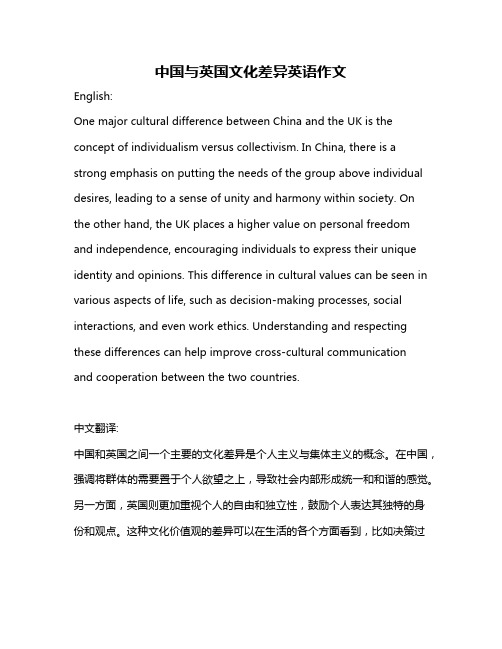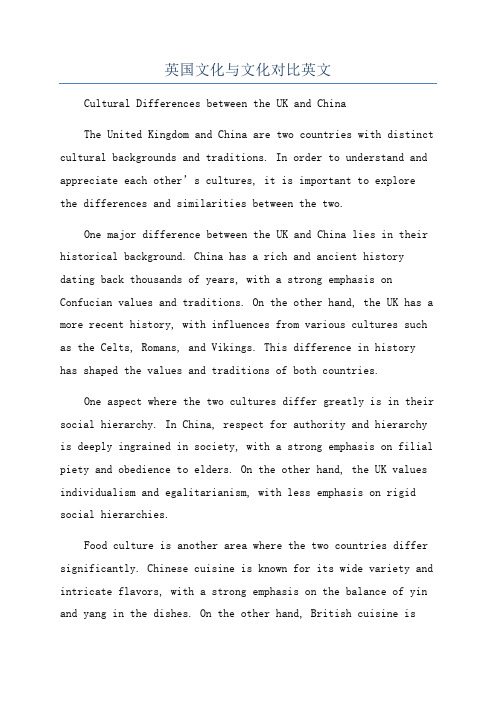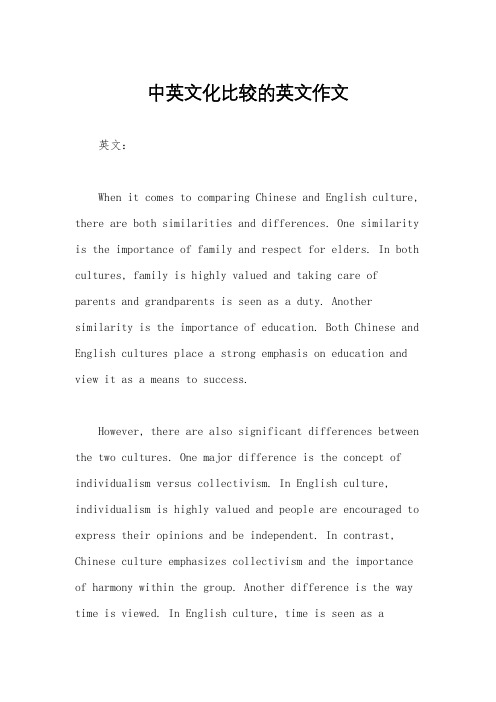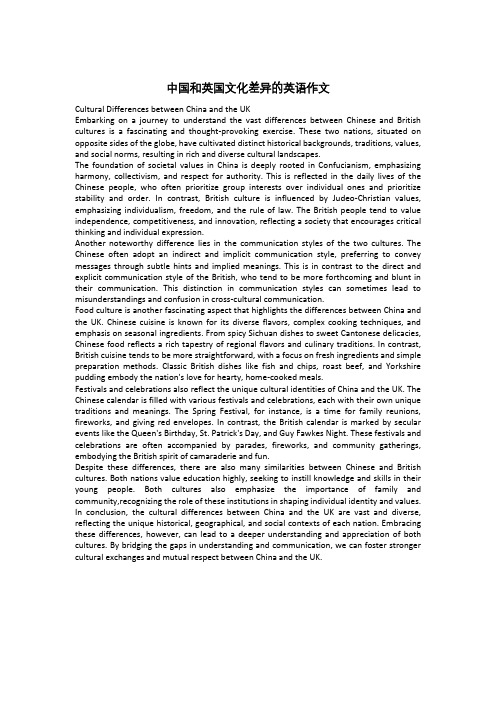英国文化与中国文化对比英文
中国与英国文化差异英语作文

中国与英国文化差异英语作文English:One major cultural difference between China and the UK is the concept of individualism versus collectivism. In China, there is a strong emphasis on putting the needs of the group above individual desires, leading to a sense of unity and harmony within society. On the other hand, the UK places a higher value on personal freedom and independence, encouraging individuals to express their unique identity and opinions. This difference in cultural values can be seen in various aspects of life, such as decision-making processes, social interactions, and even work ethics. Understanding and respecting these differences can help improve cross-cultural communicationand cooperation between the two countries.中文翻译:中国和英国之间一个主要的文化差异是个人主义与集体主义的概念。
在中国,强调将群体的需要置于个人欲望之上,导致社会内部形成统一和和谐的感觉。
另一方面,英国则更加重视个人的自由和独立性,鼓励个人表达其独特的身份和观点。
中英文化对比的英文作文

中英文化对比的英文作文英文:Culture is a fascinating topic to explore, especially when comparing different cultures. As someone who has experienced both Chinese and English culture, I find it interesting to compare and contrast the two.Firstly, one of the biggest differences between Chinese and English culture is the concept of individualism versus collectivism. In Chinese culture, there is a strong emphasis on the importance of the group and the family, whereas in English culture, individualism is highly valued. This can be seen in the way people interact with each other and in their attitudes towards personal achievement.For example, in Chinese culture, it is common for people to live with their parents until they get married and to take care of their elderly parents. This is because family is seen as the most important thing in life. Incontrast, in English culture, it is more common for people to move out of their parents' home at a young age and to focus on their own personal goals and achievements.Another difference between Chinese and English culture is the way people communicate. In Chinese culture, indirect communication is often used, where people may not directly say what they mean or may use nonverbal cues to conveytheir message. In English culture, direct communication is more common, where people tend to say exactly what they mean.For example, in Chinese culture, it is considered impolite to say "no" directly, so people may use phrases such as "maybe" or "I'll think about it" to decline an invitation. In contrast, in English culture, it is more common to simply say "no" if you are not able to attend.中文:文化是一个非常有趣的话题,尤其是在比较不同的文化时。
我国与英国的文化差异英语作文 范文模板

我国与英国的文化差异英语作文范文模板Cultural Differences Between China and the UKCulture plays a significant role in shaping a country's identity and values. When comparing China and the UK, one can observe various striking differences in their cultural practices and traditions. These disparities encompass aspects such as language, customs, social etiquette, and even culinary traditions.One notable distinction between Chinese and British culture lies in the concept of collectivism versus individualism. China, with its deeply rooted Confucian values, tends to prioritize the well-being of the community over individual desires. In contrast, the UK places a higher emphasis on personal freedom and individual achievements. This contrast is reflected in social interactions, decision-making processes, and even work dynamics in both countries.Another prominent difference is the approach to communication and conflict resolution. Chinese cultureoften values indirect communication and saving face, leading to a more reserved and harmonious communication style. On the other hand, British culture values directness and honesty in communication, even in the face of conflict. This divergence can lead to misunderstandings and cultural clashes in cross-cultural interactions.Moreover, the perception of time and punctuality differs significantly between China and the UK. In China, the concept of "Chinese time" allows for more flexibility in schedules and meetings, with less emphasis on strict punctuality. In contrast, the British culture highly values punctuality and efficient time management, considering it a sign of respect and professionalism.When it comes to social etiquette, both China and the UK have their unique set of norms and practices. For instance, the Chinese culture places great importance on respect for elders, hierarchical relationships, and rituals such as tea ceremonies. In comparison, British culture emphasizes politeness, queuing etiquette, and adherence to social norms in public settings.Culinary traditions also reflect the cultural disparities between China and the UK. Chinese cuisine is renowned for its diverse flavors, regional specialties, and communal dining practices. In contrast, British cuisine is often associated with staples like fish and chips, afternoon tea, and the traditional Sunday roast. These culinary differences highlight the distinct preferences and food cultures of each country.In conclusion, the cultural variances between China and the UK are multifaceted and deeply ingrained in their respective societies. By understanding and appreciating these differences, individuals from both countries can foster cross-cultural communication, build stronger relationships, and cultivate a sense of global interconnectedness. Embracing diversity and cultural richness can lead to mutual respect, harmony, and collaboration in an increasingly interconnected world.。
英国文化和中国文化的差异

1.Avoid roundabout way conversationIn the UK to talk about the best time to get down to business or work in a direct cut to the chase【开门见山】, beat around the bush [说话绕圈子]to speak will be treated as a waste of time. The British say "no" is not the time to start bargaining with you, but that they would like to express is that meaning. At the same time, the British are very good sense of humor, but when they are joking, appearance may seem very serious, serious conversation interspersed in a number of easy jokes.2。
Social from the bar began toChinese students the impression that the British might be polite but cool. The British generally do not like too much intimacy【隐私】, I feel so superficial and insincere【不诚实,虚假】, too much enthusiasm【热情,心】 and attention to make the British feel strange and uncomfortable, so, and their friendship really want to take some time. Privacy【隐私】 is important for the British. Personal problems, such as marriage, love relationship, finance, health and other topics should be avoided, unless the other side is a very good friend. In addition, the bar is the British like to get together with3。
英国文化与文化对比英文

英国文化与文化对比英文Cultural Differences between the UK and ChinaThe United Kingdom and China are two countries with distinct cultural backgrounds and traditions. In order to understand and appreciate each other’s cultures, it is important to explore the differences and similarities between the two.One major difference between the UK and China lies in their historical background. China has a rich and ancient history dating back thousands of years, with a strong emphasis on Confucian values and traditions. On the other hand, the UK has a more recent history, with influences from various cultures such as the Celts, Romans, and Vikings. This difference in history has shaped the values and traditions of both countries.One aspect where the two cultures differ greatly is in their social hierarchy. In China, respect for authority and hierarchy is deeply ingrained in society, with a strong emphasis on filial piety and obedience to elders. On the other hand, the UK values individualism and egalitarianism, with less emphasis on rigid social hierarchies.Food culture is another area where the two countries differ significantly. Chinese cuisine is known for its wide variety and intricate flavors, with a strong emphasis on the balance of yin and yang in the dishes. On the other hand, British cuisine isoften criticized for its lack of variety and bland flavors. However, the UK has developed a vibrant food scene in recent years, with influences from different cultures and a growing interest in international cuisines.。
英国文化及中国文化对比英文

英国文化及中国文化对比英文The cultural differences between the United Kingdom andChina are significant and reflect the unique historical, social, political, and economic backgrounds of these two nations. Inthis essay, we will explore some of the main aspects that distinguish British and Chinese culture.One of the most apparent differences between these two cultures is language. While English is the official language in the United Kingdom, China has Mandarin Chinese as its official language, spoken by the majority of its population. The written forms of these languages also vastly differ, with English using the Latin alphabet and Chinese using logographic characters.Another notable contrast lies in the cultural attitude towards individualism and collectivism. The British culture emphasizes individualism, valuing personal achievement and independence. On the other hand, Chinese culture is collectivist, prioritizing the needs of the group over the individual. Confucian principles, such as filial piety and respect for authority, greatly influence Chinese society.Food is a significant aspect of both cultures, albeit with distinct characteristics. British cuisine is often associatedwith traditional dishes such as fish and chips, roast beef, and English breakfast. Chinese cuisine, on the other hand, isdiverse and varies greatly across regions. It is known for itsemphasis on fresh ingredients, distinctive flavors, and cooking techniques such as stir-frying and steaming.Cultural celebrations also differ between the UK and China. Chinese New Year is a major event in the Chinese calendar, marked with family reunions, fireworks, and elaborate lion dances. The British celebrate holidays such as Christmas, Easter, and Guy Fawkes Night with traditions such as decoratingChristmas trees, exchanging gifts, and attending family gatherings.Religion plays a significant role in both cultures as well. Christianity is the dominant religion in the UK, with various denominations present throughout the country. In contrast, China is known for its religious diversity, including Buddhism, Taoism, Confucianism, and Christianity among others. Traditional Chinese beliefs also involve ancestor worship and spiritual practices such as feng shui.Another difference lies in the cultural attitude towards hierarchy and social etiquette. British society values politeness, punctuality, and formal manners. In China, hierarchical relationships and social harmony are highly regarded. Respect for elders and authority figures isparticularly emphasized, and proper social etiquette is crucial.These examples highlight just a few of the many differences between British and Chinese culture. It is important to note,however, that these cultural distinctions should not be seen as inherently superior or inferior to one another. Instead, they reflect unique traditions and values that have evolved over centuries. Understanding and appreciating these cultural differences can foster mutual respect and better international relations between the UK and China.。
中英文化比较的英文作文

中英文化比较的英文作文英文:When it comes to comparing Chinese and English culture, there are both similarities and differences. One similarity is the importance of family and respect for elders. In both cultures, family is highly valued and taking care of parents and grandparents is seen as a duty. Another similarity is the importance of education. Both Chinese and English cultures place a strong emphasis on education and view it as a means to success.However, there are also significant differences between the two cultures. One major difference is the concept of individualism versus collectivism. In English culture, individualism is highly valued and people are encouraged to express their opinions and be independent. In contrast, Chinese culture emphasizes collectivism and the importance of harmony within the group. Another difference is the way time is viewed. In English culture, time is seen as acommodity and punctuality is highly valued. In Chinese culture, time is viewed as more flexible and relationships are often prioritized over punctuality.Overall, while there are similarities between Chinese and English culture, there are also significant differences that reflect the unique values and beliefs of each culture.中文:谈到中英文化比较,有着相似之处也有着不同之处。
中国和英国文化差异的英语作文

中国和英国文化差异的英语作文Cultural Differences between China and the UKEmbarking on a journey to understand the vast differences between Chinese and British cultures is a fascinating and thought-provoking exercise. These two nations, situated on opposite sides of the globe, have cultivated distinct historical backgrounds, traditions, values, and social norms, resulting in rich and diverse cultural landscapes.The foundation of societal values in China is deeply rooted in Confucianism, emphasizing harmony, collectivism, and respect for authority. This is reflected in the daily lives of the Chinese people, who often prioritize group interests over individual ones and prioritize stability and order. In contrast, British culture is influenced by Judeo-Christian values, emphasizing individualism, freedom, and the rule of law. The British people tend to value independence, competitiveness, and innovation, reflecting a society that encourages critical thinking and individual expression.Another noteworthy difference lies in the communication styles of the two cultures. The Chinese often adopt an indirect and implicit communication style, preferring to convey messages through subtle hints and implied meanings. This is in contrast to the direct and explicit communication style of the British, who tend to be more forthcoming and blunt in their communication. This distinction in communication styles can sometimes lead to misunderstandings and confusion in cross-cultural communication.Food culture is another fascinating aspect that highlights the differences between China and the UK. Chinese cuisine is known for its diverse flavors, complex cooking techniques, and emphasis on seasonal ingredients. From spicy Sichuan dishes to sweet Cantonese delicacies, Chinese food reflects a rich tapestry of regional flavors and culinary traditions. In contrast, British cuisine tends to be more straightforward, with a focus on fresh ingredients and simple preparation methods. Classic British dishes like fish and chips, roast beef, and Yorkshire pudding embody the nation's love for hearty, home-cooked meals.Festivals and celebrations also reflect the unique cultural identities of China and the UK. The Chinese calendar is filled with various festivals and celebrations, each with their own unique traditions and meanings. The Spring Festival, for instance, is a time for family reunions, fireworks, and giving red envelopes. In contrast, the British calendar is marked by secular events like the Queen's Birthday, St. Patrick's Day, and Guy Fawkes Night. These festivals and celebrations are often accompanied by parades, fireworks, and community gatherings, embodying the British spirit of camaraderie and fun.Despite these differences, there are also many similarities between Chinese and British cultures. Both nations value education highly, seeking to instill knowledge and skills in their young people. Both cultures also emphasize the importance of family and community,recognizing the role of these institutions in shaping individual identity and values. In conclusion, the cultural differences between China and the UK are vast and diverse, reflecting the unique historical, geographical, and social contexts of each nation. Embracing these differences, however, can lead to a deeper understanding and appreciation of both cultures. By bridging the gaps in understanding and communication, we can foster stronger cultural exchanges and mutual respect between China and the UK.。
- 1、下载文档前请自行甄别文档内容的完整性,平台不提供额外的编辑、内容补充、找答案等附加服务。
- 2、"仅部分预览"的文档,不可在线预览部分如存在完整性等问题,可反馈申请退款(可完整预览的文档不适用该条件!)。
- 3、如文档侵犯您的权益,请联系客服反馈,我们会尽快为您处理(人工客服工作时间:9:00-18:30)。
Western students enjoy a seemingly relaxed educational experience、This, however, is not the case for students in Asia, who face crushing workloads and are often very disciplined、In the first part of her Globalist、The decision is partly based on an inability —or unwillingness —to spend thousands of dollars in tuition fees, especially given the suspicion that local schools are better anyway、After all, what more could one want from a basic education than a strong grounding in language, math and science, all subjects in which Asian schools famously excel、Our main concern is the ability of our son —and indeed the whole family —to adapt to the strict diligence that is expected of the Chinese、Apprehension increases when talking to local friends、China has a long history of standardized tests, beginning with the ancient imperial exams initiated during the Sui Dynasty、Shelly Chen is at the top of the class at the Shanghai foreign language school, one of the city’s best middle schools、Already near fluent in English, she is studying German and ranks among the highest in her gradein physics、Her goal is to get a full scholarship to Harvard to study biochemistry、It is not only Western expatriates that grow anxious when hearing about students like Shelly、Throughout England, politicians, parents and pundits worry that the industriousness and discipline of kids in the East are leaving relatively relaxed Westerners trailing behind、Though there is some debate surrounding the statistics, it is widely believed that North America is failing to produce sufficient graduates in sciences and engineering、Still less controversy attends the observation that math scores throughout the West rank well below those of most Asian countries、As a result, there is a deepening consensus that, in order to maintain its competitive edge,Chinese students are taught that all questions have but one right answer and there is little room for debate、North American education needs to move away from an emphasis on fun, flexibility and individual learning styles、Instead, it has to shift towards a more strict, disciplined teaching environment that math and science, in particular, seem to demand、This shift can be discerned even in Canada, wherethere are no college entrance exams, and where, standardized testing, memorization and rote learning have long been frowned upon、Nevertheless, there is a mounting chorus complaining that the prominence given to creativity cheats students out of a proper education、People like science teacher Sumitra Rajagopalan are entreating Canadian educators to adopt a more Asian pedagogical philosophy based on “constant repetition, recitation, grilling and drilling”、In the United States, the rise of China and India is putting even more emphasis on the demand for education reform、Tougher standards,New policies —such as No Child Left Behind — have led to an increased stress on standardized testing、In the 2006 State of the Union address, President George W、Bush mentioned the threat of Asia’s giants specificall y when introducing his “Competitive Initiative”, a program that promises substantial funds for the teaching of basic math and science、But in an ironic twist, there is an increasing desire to make education more England in China、Many now agree that the lack of creativity in China’s education system will soon prove a major stumbling block in the country’s continuing development、Government and business leaders worry about a derivative, manufacturing-based economy, which is unable to innovate core technology, lacks major research and development projects —and lags far behind in creative sectors like marketing and design、A lack of flexibility and inability of individuals to take the initiative affects the entire service sector, paralyzing employees at every level、Arriving late for the set breakfast at a five-star hotel in Chengdu, for example, I, along with a group of other foreigners, found that the coffee had run out、Our request for more threw the staff into crisis、It was not until a series of meetings had been held and permission sought from senior management that a fresh pot could be brewed、Passing even trivial problems up the management hierarchy in this way is simply impossible in a sophisticated post-industrial society、China has implemented a set of reforms known as “quality education”、This policy, which aims to teach creativity and emphasize character development, has resulted in certain concrete shifts including changes to textbooks, an increased emphasis on oral skills in language learning —and various attempts to get teachers to encourage student participation、Most Chinese, however, are skeptical that anything other than surface transformation is taking place、As they are quick to point out, the underlying issue —an education system rooted in standardized tests —has yet to be altered、Chinese students achieve near perfect scores on Western standardized exams、But when go abroad, they find themselves ill prepared for the education、Today, national tests determine which elementary, high school and university a student will attend、They are still the single most important factor in deciding one’s general career path、The weight given to testing is regularly criticizedthroughout Chinese society、Newspapers and magazines commonly report on the extreme pressure of the general exams、Stories range from concern over the suicide rate to bizarre anecdotes like the one about girls in Guangdong province who are said to have bought up mass quantities of contraceptive pills and then taken them during the test period — in the hope of warding off the ill effects of their menstrual cycle、Despite these concerns, there is little real impetus for the testing system to change、In China, standardized tests are seen as the only way to guarantee meritocracy and ensure fairness、The Canadian method of granting university admission on the basis of interviews and grade point averages is seen as far too subjective、In China, many believe that in a system like this the best schools, universities and jobs would go only to those with the right guanxii (connections)、China’s emphasis on memorization and rote learning has significant consequences、Students are taught that all questions have but one right answer and there is little room for debate and original thought、Subjects like history and politics are focused solely on dates and names、Even the Chinese language exam, which requires students to write essays, allocates grades according to how well one can quote classical texts and idioms、Passing trivial problems up the management hierarchy is simply impossible in a sophisticated post-industrial society、As a result, Chinese students develop what appears to many Westerners as a shocking capacity for memorization、Many are able to recite entire articles and there are stories of some who are capable of committing the entire dictionary to memory、Chinese students thus regularly achieve near-perfect scores on the standardized exams of Europe and England、when they go abroad many of these students find they are ill-prepared for Western education、Chinese students with phenomenal TOEFL (Test of English as a Foreign Language) scores are often incapable of taking part in simple English conversation、At least one graduate school in one of England’s most eliteuniversities has now become wary of accepting students from China for this reason、Assumed skills such as in-class participation, seminar presentations and individual research projects, common practice in elementary schools in North America, are largely unheard of in the Chinese classroom —even in most universities、National tests determine which school a student will attend、They are the most important factor in deciding one’s career path、Moreover, the stress on original thinking and strict rules regarding plagiarism often seem baffling to students from China、An American teacher working in Yunnan province tells of encountering this cultural divide when two students handed in the exact same essay for an in-class exam、Because of diffrent traditions and cultures,there are many diffrences between Chinese education and British education、Firstly,the Chinese education is "nine year compulsory education"、Most of schools are public schools、And the tutions come from the government、And the British education is also compulsory education、But the school system is two-track system which included the publicschool and the private school、And the tutions are free in the public school while those come from the students' parents in the private school、Secondly,the Chinese schools only have some subjects,such as Chinese,maths,English,history,physics and so on、The Chinese students must study these subjects every day、And they must work hard that they hardly have spare time、But in Britain,the students have chances to choose an elective cource to expand their knowledge and visions、And they have much more spare time to play than Chinese students、Finally, the Chinese educational system is very simple、Most of students have to pass the college entrance examination、And then they can go to college to study a major、But in Britain, the students have many choices to study、There are many technology schools、Every body can enter without certisfication and limeted age、Although there are many differences between the Chinese educantion and the British education,they have some adventages and disadventages in some aspects、。
